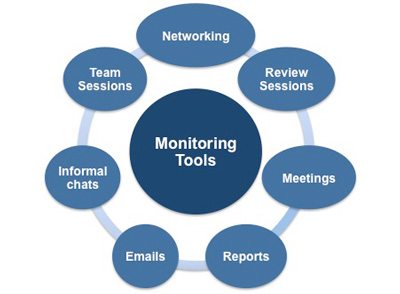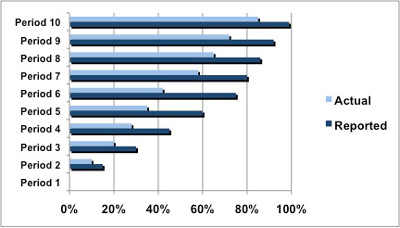Monitoring Delegated Tasks
Now that you've delegated your task, all you have to do is to read your regular reports and ensure that the deadline is met. As a manager, the most important aspect of this reporting is openness. This will be shown by your willingness to be objective when facts are reported to you and to support the person you've delegated the task to, with additional resources and support as needed.
It is up to you to ensure that you maximize the opportunity to show this openness during your regular review sessions. You can achieve this by truly listening to what you are being told and by identifying the signs that someone is not being totally open with you - for example, by not maintaining eye contact or through similar other signs. This could be due to the fact that they don't want to disappoint you with bad news.
By using your questioning skills, you will also be able to identify inconsistencies that may provide you with early warning signs of potential or real problems. These questions need to be asked in such a way that the person the task has been delegated to, or others involved in the process, don't regard it as interference. If the questions are subtle enough the people involved may not even be aware of what you are doing.
This openness can be established when you exchange your brief by asking for the delegate's agreement to its contents and offering them this initial opportunity to feed back to you any concerns or issues they can see that may cause problems as the task progresses. By showing your willingness to receive feedback, you send the signal that you want an honest and open exchange to be an integral part of the delegation process.
One way to safeguard against problems in this area is to make sure that you use a variety of tools as part of your monitoring. The most popular tools are:
 |
Your main responsibility now is to monitor progress in order to ensure that the task is completed on time. One of the most difficult problems you will face when monitoring delegated tasks is the so-called over-reporting problem. This becomes a greater risk as the complexity and length of the task increases.
Recognizing Over-reporting
The over-reporting of progress occurs because people tend to be over-optimistic to start with, and is compounded by the fact that managers tend to encourage it. This may be done unconsciously, by reacting positively and uncritically to optimistic progress reports.
Feedback is an essential part of the delegation process and this must be a two-way process, one where questions and listening are key aspects to ensure the communication is open and supportive.
Shown below is a graphical representation of the typical over-reporting scenario. The explanation of how this occurs follows.
 |
1. At the beginning of period 1, the estimated 'percentage complete' of the task is zero.
2. At the beginning of period 2, the natural optimism or the desire to appear productive, has resulted in a report indicating the task as being 15% complete whereas in fact it is only 10% complete.
3. At the beginning of period 3, the task is reported as being 30% complete whereas in reality it is only 20% complete. Optimism may still be a factor, as may the desire to maintain the rate of progress that was reported earlier. This problem will be compounded if the manager is actively encouraging the reporting of rapid progress. This discrepancy increases through periods 4 and 5.
4. At the beginning of period 6, the team member feels under pressure to report that the task is 75% complete, in keeping with previous progress. At this point they are probably aware that their claims about the progress of the task have over-estimated the actual work completed, but it is difficult for them to admit that they have been exaggerating. Consequently, the manager may receive a progress report that is underestimating the amount of work remaining. That is, the manager believes that only 25% of the project remains to be completed, not the 58% that is in fact the case.
5. At the beginning of period 7, the reported progress falls as the team member realizes the reality of the situation. They cannot keep reporting this rate of progress otherwise they will be reporting completion when in fact the task is only 58% completed. The usual reaction is to report an update such as half of the expected progress in the hope that they can bring the reported and actual progress into alignment at some point in the future.
Over-reporting often leads to a situation where tasks always seem to be 80% to 90% complete. The best way to avoid over-reporting is to implement objective measures of progress, rather than asking for a subjective estimate.
You should never underestimate the unwillingness of team members to admit that progress has been over-reported or their ingenuity in trying to disguise that it has.
One of the tactics that people use to try to dig themselves out of the hole they have dug by over-reporting, is to take on additional work in parallel to the over-reported task in the mistaken belief that they will be able to save some time in new work and use this to make up the 'lost' time in the over-reported work.
This is very unlikely to have the desired effect and the usual outcome is that the over-reporting remains hidden for longer and is more of a problem when it eventually surfaces.
You may also be interested in:
Delegation of Authority | Principles of Delegation | The Six Stages of Delegation | Delegation in Management | Advantages and Disadvantages of Delegation.



